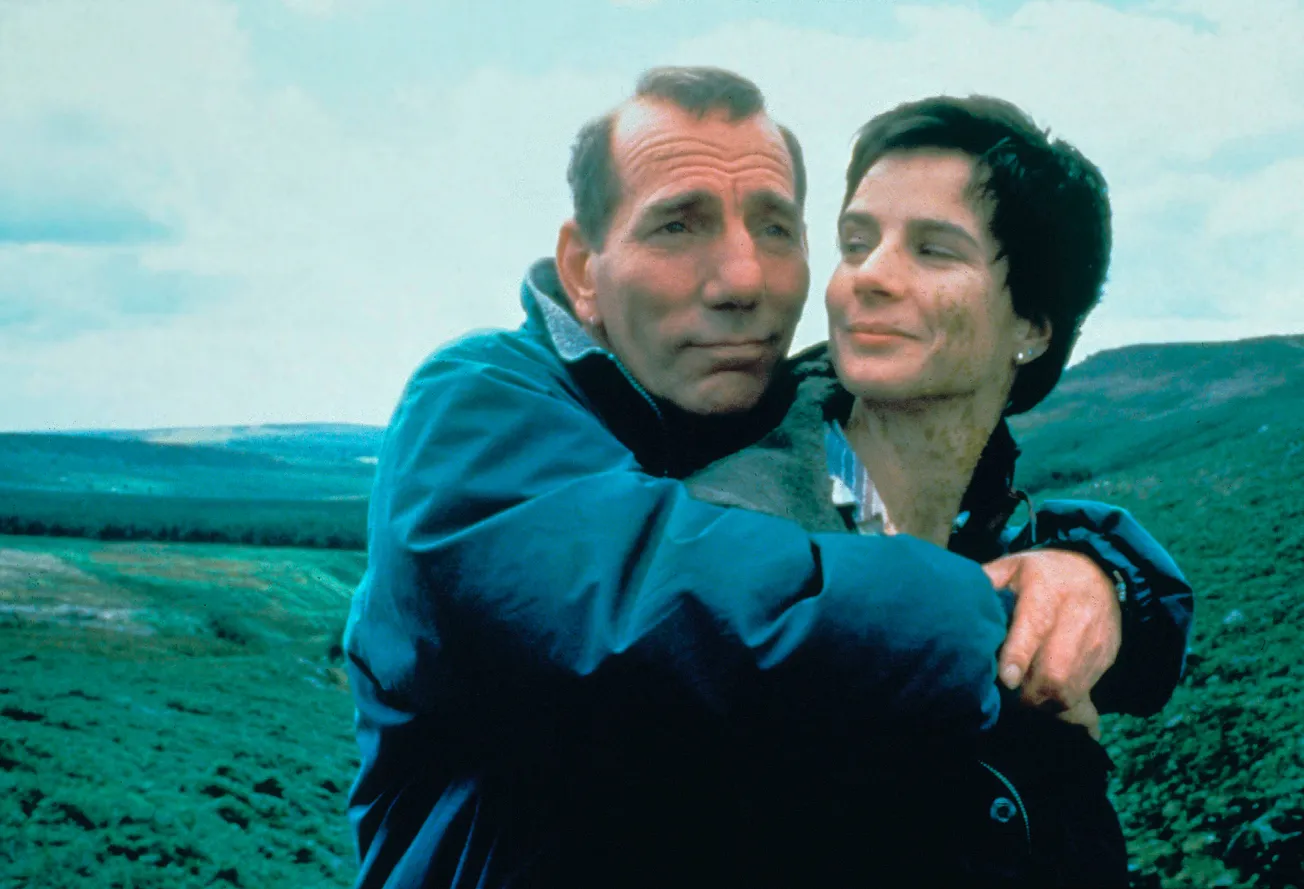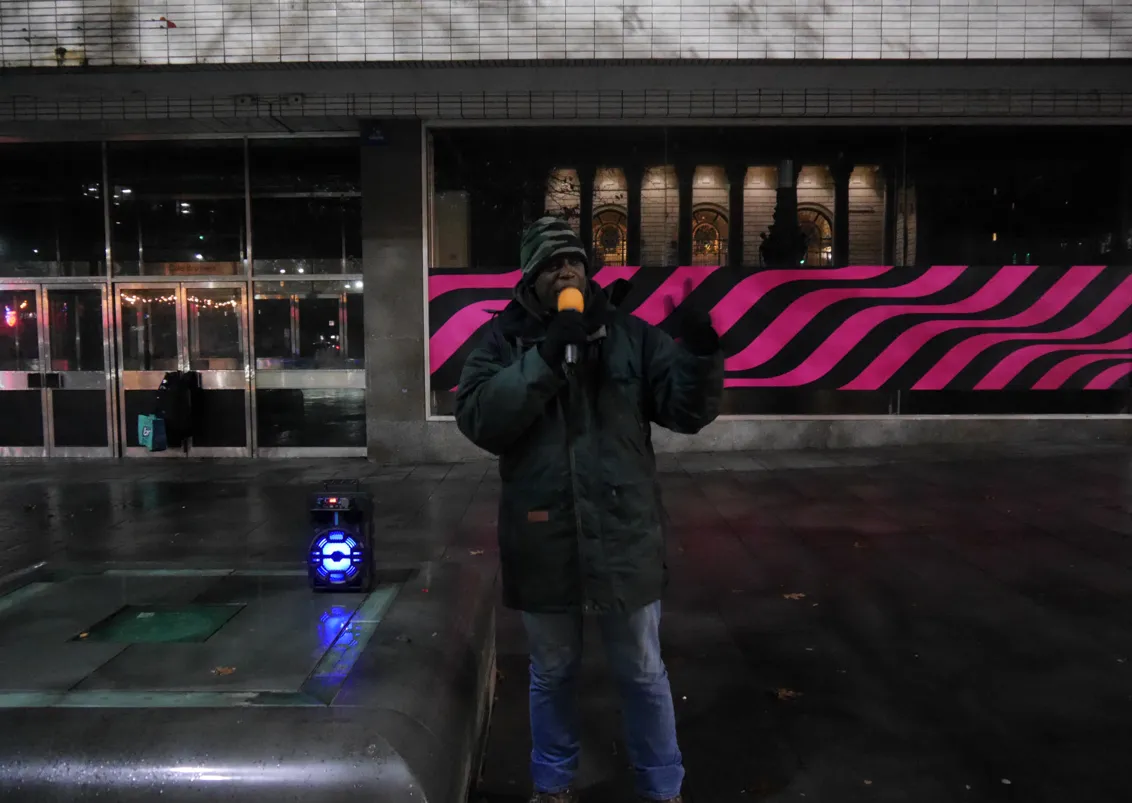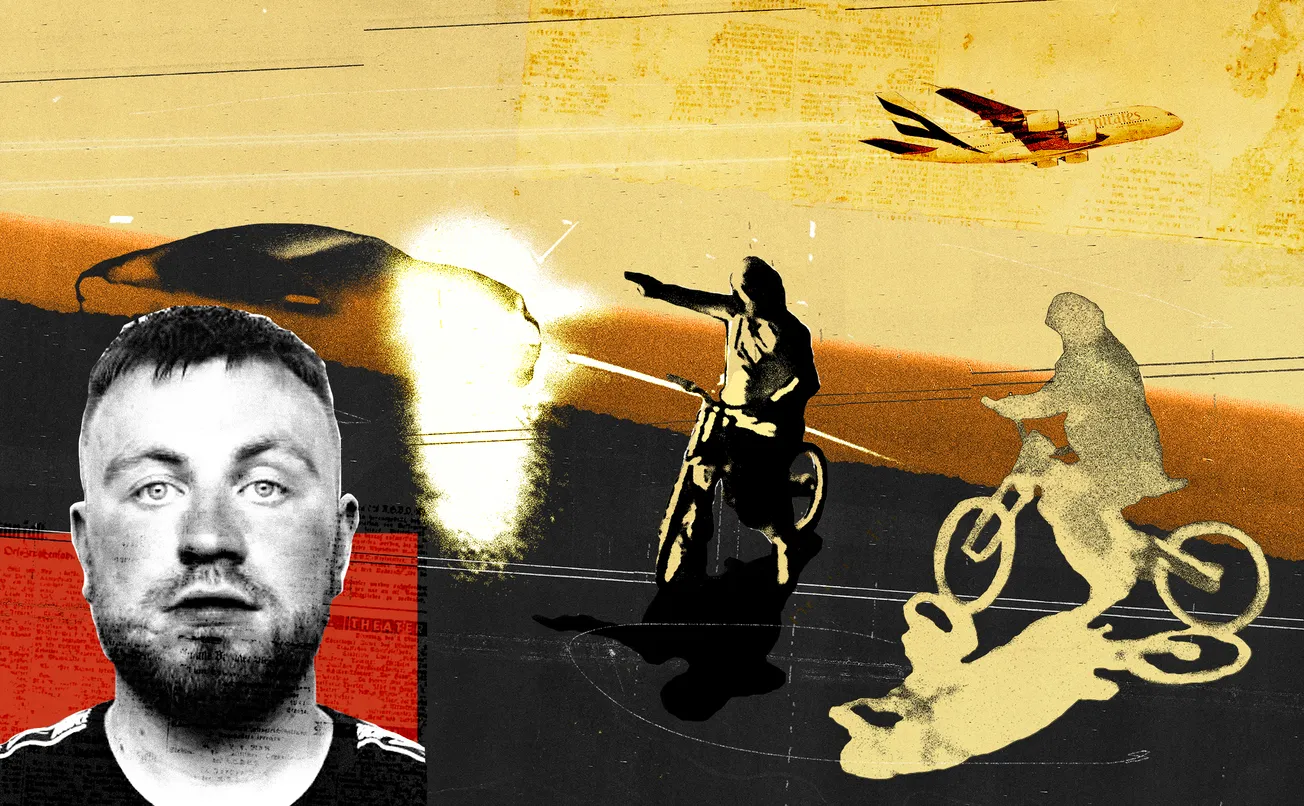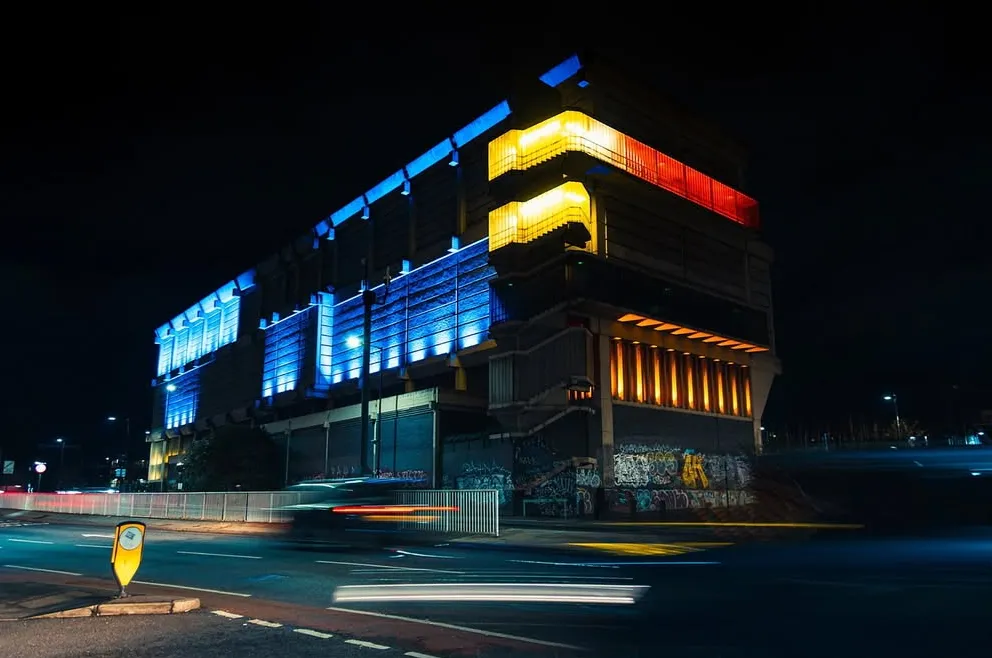In Hollywood, a “blank check” film is the risky passion project a director gets to make in the afterglow of a huge box office success. For example, had the folks at Warner Brothers not been giddy at the billions raked in by The Dark Knight in 2008, it’s unlikely they would have been so quick to hand Christopher Nolan a couple hundred millions to make Inception a few years later. Sometimes, as with Nolan, the risk pays off for the studio. But not always.
Though the 1998 film Among Giants only had a budget of less than £2.5m, it was undeniably something of a blank check project for screenwriter Simon Beaufoy. The script had been gathering dust in a desk drawer until the runaway success of his second attempt at writing about working-class Sheffield men — a little flick you may have heard of called The Full Monty — meant executives were looking for more. Among Giants, which follows a group who take cash-in-hand work painting electricity pylons on the moors around Sheffield, came out just a year after Beaufoy’s big break. Unfortunately for him, the nicest thing most reviewers had to say about it was that they really, really liked The Full Monty.
The Sunday Mirror damned the film with faint praise, saying it was “equally expert” but “not quite so obviously crowd-pleasing[...] as that earlier Sheffield spectacular”. David Stratton, in Variety, minced his words far less: “It lacks the humor and passion that made Monty such a treat.” According to one critic, the only thing Among Giants has over the previous film is that you actually do get to see “the full monty” at one point, during a scene in which the late Pete Postlethwaite runs naked with his beau through the water streaming off the Tinsley Towers (surely the most industrial Sheffield love scene imaginable).
The film was a resounding flop, grossing less than half a million worldwide, and it seems to have almost evaporated in the decades since. If you want to give it a watch today, your options are limited. You can, in theory, buy it on VHS from Amazon — although it’s out of stock at the moment — or else watch a blurry upload on an obscure Russian website, which currently has less than 2,500 views. (If anyone asks, I bought the last VHS.)
You could argue Among Giants was doomed to obscurity by its subject matter. Watching men get their kit off is, to most people, always going to be a more entertaining prospect than watching men paint electricity pylons. (You are, as more than one underwhelmed viewer pointed out, literally watching paint dry.) Some blame should also lie with the film’s marketing, which pitched a kitchen-sink drama as a feel-good summer romance. In a trailer that features a jarring American-accented voiceover, viewers are promised that the protagonists — Ray, played by Postlethwaite, and Gerry, played by Rachel Griffiths — will “climb new heights, rise above it all [and] fall in love,” as “Higher and Higher” by Jackie Wilson plays in the background. To anyone enticed by this frothy pitch, the actual film must have been a let-down.
Which is a tragedy, in my opinion, because Among Giants deserved much more acclaim than it got. True, as many critics complained, it is not as funny as The Full Monty, although it’s far from humourless. There is also less obvious excitement and peril in its plot — at least until the film’s final act. Where The Full Monty shouts, Among Giants murmurs, but I’d argue it has even more interesting things to say.
“I never even knew they were painted,” one character remarks at the beginning of the film, when he discovers he’s going to spend the next three months painting electricity pylons. “Maybe it’s a wind-up,” his friend replies. But Postlethwaite’s Ray, the de facto leader of their gang of seven, has indeed made an illicit deal with an employee at the electricity company: they’ll paint 15 miles of pylons by September, in exchange for £80 each a day, but only if they get the entire job done before the volts are switched back on. “Best paid job you’ll ever have,” Ray tells the group — but only because they’re being hired without the permits or proper safety protocols such dangerous work requires. “No contract, no stamps, no union bollocks, cash in hand, no problem,” as their new boss puts it. They fall into a new routine, of bundling into old vans, calling each other “bastard” every other sentence, fighting, climbing, and painting.
These pylons are the giants of the film’s title and, among them, we find Australian hitchhiker and climbing fanatic Gerry, who promptly scales one without a harness to ask Ray for a job. She’s in Sheffield to see if the climbing is as good as people claim — “Doesn’t come any better than the millstone crag,” fellow climber Ray assures her — but also because she has perennially itchy feet. When Ray asks how long she’s been travelling, she replies: “How long is a piece of string?”
Ray, who has spent his entire life in Sheffield, is her complete opposite — settled in his own place, but still popping back to visit his estranged wife and their two kids on occasion. Some critics complained that the romance between the pair seems to spring from nowhere, especially given the large age gap between the two, but it’s just not spelled out in capital letters.
In a scene before their first kiss, Ray takes Gerry to the top of the now-demolished Hillfoot gas tank in Neepsend and points out the factory where his dad used to work, the church where he was christened, his school. “I think it’s beautiful to have your whole life laid out like that before your eyes,” Gerry remarks, adding mournfully that all she has “is a whole bunch of people I’m never going to see again and a whole bunch of places I’m never going to go back to”. She’s drawn to Ray because she wants to try a new, more rooted way of life on for size — slipping it on as easily as she dons one of his old suits in an earlier scene.
The film as a whole is much more subtle than The Full Monty, which is maybe why it didn’t land outside of Sheffield. In The Full Monty, for example, if you happen to miss the first reference to the character Dave’s insecurities about his weight then, never mind, it will be underlined a second, third and even fourth time. The more successful movie even begins with a tourism ad for the city of Sheffield — describing it as a “city on the move,” oddly similar to the council’s current insistence that we are “on the up” — to get viewers up to speed. Among Giants is far less willing to hold anyone’s hand.
It’s similarly circumspect about the economic pressures the characters are under. We’re aware everyone is behind on rent and that one character is in trouble with loan sharks, but not everyone is as skint as it first seems, with Ray managing to find the money for an expensive engagement ring from somewhere (“£400 plus VAT”, one of the gang notes). What will they all do once the electricity is switched back on? No-one talks about it.
Despite the obvious risks, unpleasant conditions and sometimes hostile weather, there is a romance to what they’re doing. “You love being up here,” Gerry tells Ray at the top of a pylon, and he admits it’s true. “I’m king up here, lass.” Throughout the film, the men sing traditional American folk songs and spirituals as they work. They’re cowboys on the frontier, with the same just-outside-the-law freedom. When Ray and Gerry throw an engagement party in the local working men’s club, everyone joins in with the line dancing.
But there’s only so much escapism available in Sheffield. The summer won’t last forever. “Don't go enjoying yourself,” an older member of the gang warns a young one, who’s starting to get into the dancing. “You'll only brood about it in years to come.”
The main tension in the film is whether Ray and Gerry’s relationship will work out, essentially a contest of wills between his settled ways and her roving ones. Coming in between them is Steve: Ray’s younger, wilder friend, who shares Gerry’s wanderlust and who she acknowledges is her more usual type. In life, Steve tells Gerry at one point, “there are goers and there are stayers”. They are both goers; Ray is a stayer.
Beaufoy’s script was inspired by an aborted attempt to make a documentary about pylon painters in Wales, which he abandoned after being refused permission to shadow them. But he also drew from his own knowledge of climbing in Sheffield, which he deploys to great effect. The divide between Ray and the two younger people in the quasi-love triangle is mirrored by the kind of climbing they most prefer. In one of the film’s most memorable scenes, Gerry and Steve take turns using their bouldering skills to move around the (now closed) Vine Inn in Sharrow without touching the floor. Ray, by contrast, is happier scaling vertically up and down the slabs of places like Froggatt Edge. Even when he climbs, he is still essentially staying in the same place.
But Steve’s wanderlust, the film suggests, is not quite of the same type as Gerry’s. Though we’re never told much about her background in Australia, it’s clear she is travelling towards something — even if she’s not quite sure what — whereas Steve wants to get away from South Yorkshire. “There’s no shitty moors in Goa, I’m telling you,” he announces to the group, gleefully.
I’m reminded of my interview with Bill Stephenson, the photographer best known for documenting the city’s working class in the 1980s and beyond, whose first project involved snapping shots of local beauty competitions. At first, he couldn’t understand why the young women involved were putting themselves on display, until he realised the prize they were competing for was a modelling contract in London. “They wanted to win,” he told me, “to get out of a city that was then certainly in decline.”
Among Giants’ marketing was not wholly inaccurate — it is indeed the story of a dizzying, whirlwind romance. Beneath the surface, however, there is a vein of tragedy, one that also exists in The Full Monty, albeit more thoroughly concealed. In The Full Monty, the characters are out of work, but there is always the hope they will get some. In Among Giants, they have work, but it feels bizarrely pointless. As one man observes to his friend, they are painting the pylons grey, “but what colour would they be not painted?” Also grey. At least from the ground, it’s as if they’ve not done anything at all. (Except one pylon, painted pink to celebrate the engagement — for which the film crew actually repainted a pylon outside Rochdale, which remained a curious local landmark until it was pulled down in 2013.)
Even the film’s central tension seems to go round in circles, with no clear resolution. Are you a stayer, or a goer? There seems to be no right choice. At one point, Gerry bemoans how boring her constant travels have become: “meeting one stranger after another, hearing all their stories and all the stories end up being the same story, about me and them having a shag”. The more she moves, the more things stay the same. But, when she remarks how beautiful it is that Ray has his entire life to date spread out as a vista before him, his response is similarly mournful. “I think they’re going to knock it down soon,” he says. The more he tries to hold on, the more everything insists on changing.
Though Beaufoy wrote the script for Among Giants before his big break with The Full Monty catapulted him to the screenwriter’s version of stardom, it became an interesting prophecy of his own situation afterwards. The doors of Hollywood were suddenly flung open for him; Miramax bought the script for his third film, a comedy about hairdressers called Never Better, without even reading it. So would he stay, or would he go?
Like his protagonist Ray, it seems Beaufoy is more of a stayer. "It was quite interesting to be offered literally millions of dollars to write stupid films, but in the end I realised that Hollywood was not really my world at all," he told the Guardian at the time, "which is why it's a huge irony that The Full Monty made such a vast sum.” He disliked the way Never Better was watered down to make it palatable for an American audience — "It's become more like New Yorkshire” — and he wasn’t interested in making films that were easy to digest, the way many people clearly hoped Among Giants would be.
Back on the moors, the summer ends with a literal jolt — the power company has switched the cables back on. The charade is over, and the characters suddenly face the same choice that Sheffielders have confronted for decades: stay, or go.







